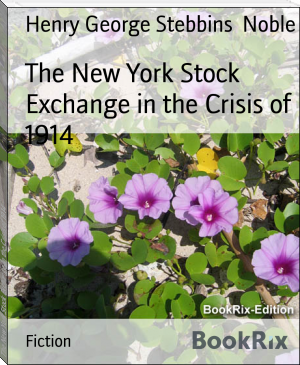The New York Stock Exchange in the Crisis of 1914 by Henry George Stebbins Noble (romantic books to read TXT) 📖

- Author: Henry George Stebbins Noble
Book online «The New York Stock Exchange in the Crisis of 1914 by Henry George Stebbins Noble (romantic books to read TXT) 📖». Author Henry George Stebbins Noble
supposed impossibility was performed by the joint and determined
action of the financial community. On the other hand, and as a
counterpart to this valuable experience, it must never be lost sight
of that the extraordinary war measures of 1914 may be a danger to the
future if they are misinterpreted. There is a possibility (even a
probability) that when ordinary crises arise in times to come, people
who find themselves financially embarrassed will bring enormous
pressure upon the authorities of the Exchange to renew the drastic
expedients of the famous thirty-first of July. It is to be sincerely
hoped that there will always be firmness enough in the Governing
Committee to resist this pressure. The great world war coming, as it
did, without warning was a rare and epoch-making event that warranted
unheard of action and to indulge in such action for any lesser cause
would be utterly disastrous.
The Committee of Five seems to have been brought into existence under
a lucky star. That five men called together so suddenly in such an
emergency should have worked with absolute harmony for so long a time
is quite remarkable. Their unanimity was never troubled but once. On
one of the first few days of their career a rather positive and
aggressive member, arguing with a colleague, said "you must remember
that you are only one of this Committee." The Committeeman thus
addressed responded with calm determination "and you must not forget
that you are not the other four." This encounter excited much
amusement among the remaining members and was the one and only
occasion where anything resembling a serious difference appeared.
In addition to being blessed with harmony they were very fortunate in
having passed rulings for so long a time without giving forth anything
that had to be recalled. In view of the complexity of the conditions,
fortune must have aided in this as well as judgment. They were, of
course, treated to much wisdom (after the event) by their critics.
They were told that they might have opened the Exchange sooner after
the actual opening had proved a success, and they were informed in
the editorial columns of a prominent journal that their fear of
foreign liquidation had been an "obsession" which lacked
justification. These critics never were heard from while the event was
in doubt, and consequently the Committee did not profit much by their
learned sayings.
It can be stated with confidence that the intelligent resourcefulness
of the Stock Exchange, in conjunction with the splendid public
spirited work of the New York banks and the press, warded off a
calamity the possible magnitude of which it would be difficult to
measure. The success of this undertaking should be a source of pride
and emulation to those future generations of brokers who will have to
solve the problems of the great financial market when in the words of
Tyndall, "you and I, like streaks of morning cloud, shall have melted
into the infinite azure of the past."
THE END
Imprint
Publication Date: 04-30-2015
All Rights Reserved
 Have you ever thought about what fiction is? Probably, such a question may seem surprising: and so everything is clear. Every person throughout his life has to repeatedly create the works he needs for specific purposes - statements, autobiographies, dictations - using not gypsum or clay, not musical notes, not paints, but just a word. At the same time, almost every person will be very surprised if he is told that he thereby created a work of fiction, which is very different from visual art, music and sculpture making. However, everyone understands that a student's essay or dictation is fundamentally different from novels, short stories, news that are created by professional writers. In the works of professionals there is the most important difference - excogitation. But, oddly enough, in a school literature course, you don’t realize the full power of fiction. So using our website in your free time discover fiction for yourself.
Have you ever thought about what fiction is? Probably, such a question may seem surprising: and so everything is clear. Every person throughout his life has to repeatedly create the works he needs for specific purposes - statements, autobiographies, dictations - using not gypsum or clay, not musical notes, not paints, but just a word. At the same time, almost every person will be very surprised if he is told that he thereby created a work of fiction, which is very different from visual art, music and sculpture making. However, everyone understands that a student's essay or dictation is fundamentally different from novels, short stories, news that are created by professional writers. In the works of professionals there is the most important difference - excogitation. But, oddly enough, in a school literature course, you don’t realize the full power of fiction. So using our website in your free time discover fiction for yourself. 




Comments (0)